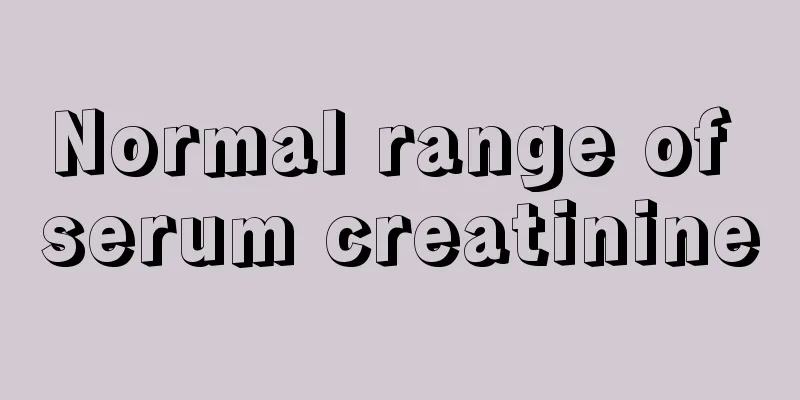Normal range of serum creatinine

|
For those of us who are not medical personnel, we may not be familiar with the professional terms used in hospitals. Some people often ask what serum creatinine is and what is the normal range of serum creatinine? The value of serum creatinine is determined by blood analysis through venous blood sampling. The value of serum creatinine can reflect whether a person's renal function is abnormal, which is of great clinical significance. Generally speaking, there are deviations in serum creatinine values between men and women. The correct name of serum creatinine (Cr) is blood creatinine. Blood creatinine is generally considered to be endogenous blood creatinine, which is a product of human muscle metabolism. In muscles, creatine is mainly converted into creatinine through irreversible non-enzymatic dehydration reaction, which is then released into the blood and excreted in the urine. Therefore, blood creatinine is closely related to the total amount of muscle in the body and is not easily affected by diet. Creatinine is a small molecule that can be filtered through the glomerulus and is rarely absorbed in the renal tubules. Almost all of the creatinine produced in the body daily is excreted in the urine and is generally not affected by urine volume. Clinically, testing serum creatinine is one of the main methods to understand renal function and is an important indicator of renal function. Elevated serum creatinine means renal damage. 1. Increased serum creatinine (1) Acute and chronic glomerulonephritis, nephrosclerosis, polycystic kidney disease, rejection after renal transplantation, etc. For patients with chronic nephritis, the higher the serum creatinine level, the worse the prognosis. Creatinine concentration increases in uremia and severe congestive heart failure. (2) Dehydration, blood loss, shock, heart failure, strenuous physical activity, acromegaly and gigantism, increased serum creatinine. 2. Reduced serum creatinine can cause muscular atrophy, severe liver disease, leukemia and renal insufficiency. 3. Serum creatinine concentration is used for the first stage of decomposition of chronic renal insufficiency (compensatory stage of renal insufficiency): GFR50~80mL/min; Scr133~177μmol/L. Stage 2 (decompensated renal insufficiency): GFR50~20mL/min;scr178~442μmol/L. Stage 3 (renal failure stage): GFR 20~10mL/min; SCR 443~707μmol/L. Stage IV (uremia stage): GFRmin;scr |
<<: What is the reason for low serum bilirubin in physical examination
>>: Shrimp balls and fish balls are equivalent to contraceptive pills
Recommend
Can breast enhancement essential oil really enlarge breasts?
Essential oils have many functions, one of which ...
What is the effect of Fuling red bean and pork bone soup
Poria cocos and red beans are a good combination ...
Pimples on eye bags
Pimples on eye bags are a common symptom. The mos...
Pustular acne around the mouth
Acne is a common skin disease in life. It mostly ...
Is laryngeal cancer hereditary in the family?
There is no clear research report on the impact o...
How to tell if dumplings are cooked
Although modern diet is rich and diverse, it cann...
Under what circumstances can skin cancer be contagious
Skin cancer is the most dangerous skin disease. P...
Symptoms of erythematous antral gastritis
If you are used to eating one meal and skipping t...
Are there risks in liver cancer interventional treatment? You must know these before liver cancer treatment
Interventional therapy is a minimally invasive su...
What is the cure rate of tongue cancer surgery
The existence of cancer is a major threat to huma...
What is the licorice hangover method
In our daily life, we often have social activitie...
What are the symptoms of otitis media
Otitis media affects many people, and patients wi...
What is the normal blood sugar level when the blood is empty?
Due to various reasons, some people often have ab...
How to prevent hair loss in autumn
Hair loss is a very common phenomenon in life, es...
Are there any early symptoms of lymphoma that can be cured?
What are the early symptoms of lymphoma? Is it cu...









